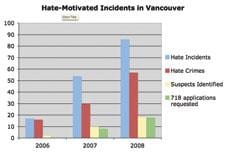The number of hate crimes investigated by the Vancouver Police Department (VPD) has more than tripled since 2006, according to new statistics recently released by the VPD.
Det Tim Houchen attributes the jump in part to a better understanding among police officers of how to identify crimes motivated by bias or hate.
Last year, the VPD hate crimes team examined 167 files and uncovered 86 hate-related incidents.
And the incidents are still probably being underreported, says Houchen, who until recently ran the VPD’s hate crime team.
Houchen notes the numbers don’t only pertain to gaybashings. But the two groups most often targeted in Vancouver, he says, are the gay and Jewish communities.
“We look at who’s being targeted and who feel the most fear,” Houchen says, “and that’s why the LGBT community and the Jewish community are the two communities that we work with the most.”
Det Cheryl Leggett recently stepped into Houchen’s role on the hate crimes team. An openly lesbian officer, Leggett is known around the Davie Village for her work as the liaison officer at the West End Community Policing Centre, and counts herself among those with a personal interest in preventing gaybashings.
Leggett attributes Vancouver’s spike in hate crime investigations in part to the efforts made by the VPD and community groups like The Centre to encourage people who have been bashed to report it.
Doug Janoff, a researcher who specializes in anti-gay hate crimes and violence, also emphasizes the ways that police and community report and record gaybashings.
In a city like Ottawa, which holds monthly liaison meetings between police and the gay community, Janoff says, the consistency of reporting “takes the sting out of it a little bit.”
“When there is an information flow taking place on a regular basis, then it loses some of the perception of it being an epidemic,” he remarks.
In Vancouver’s nearest gay village south of the border, Seattle’s Queer Ally Coalition (QAC) is taking steps to improve community dialogue about hate crimes. Co-founded by gay Iraq veteran and anti-war activist Chanan Suarezdiaz, and recent New York transplant Eli Steffen, the group recently hosted a “Queers Unite! Take Back the Night” rally and march in Seattle’s Capitol Hill district.
About 350 people attended the “loud, boisterous event,” says Steffen, which aimed to reclaim the area “as a safe space for queer people.”
In what may parallel Vancouver’s experience in recent months, Steffen says the need for this event was made clear by a “really alarming spike” in known violence against LGBT people. According to him, at least six gaybashing incidents have already been recorded in or near Capitol Hill this year.
FBI statistics for 2007 also demonstrated a rise in anti-queer hate crime when compared to hate crimes as a whole.
Some consider the high-profile legal battles against gay rights a contributing factor.
“Efforts to amend the state constitution to preclude forever a same-sex couple from marrying are but one component of that system of violence,” North Carolinian News & Observer columnist Shannon Gilreath wrote last May.
Steffen echoes these sentiments and attributes an increasing boldness on the part of attackers in part to constitutional bans on gay marriage and the controversy over Proposition 8 in California.
He also thinks there may be a link between the economic recession and minority scapegoating.
“I think we want to believe that,” remarks Janoff, “but how much of that is actually provable is another question.”
Although some connection between economic conditions and the prevalence of lynchings in the pre-Depression South have been made, efforts to duplicate the findings using contemporary methods and data have yet to conclusively find a link.
“While it can be an interesting exercise to question why these particular events are happening at this particular time,” Janoff notes, “I think it’s an even more useful exercise to question: why is this not stopping?”
“Increased alcohol consumption increases the potential for altercations in any community,” notes Leggett, when asked if the close proximity of the Granville strip diminishes safety in Vancouver’s gay village. After a night out on Granville, some people are “causing problems with anybody they encounter” %mdash; including gays, she says.
Steffen points out that some Seattle gays have raised the idea of revitalizing that community’s nightly Q Patrol.
“Are there ways of framing some sort of Q Patrol where it’s not about meeting violence with violence, but about offering protection to our community?” he wonders.
“Instead of people roaming around with various weapons,” Steffen says he would rather see a kind of escorting service, “where people can call us and we walk you home at night or something of that nature.”
Whatever strategies are chosen to curb the gaybashings, Steffen notes, “if this is something we want as a community, people need to step up.”

 Why you can trust Xtra
Why you can trust Xtra


